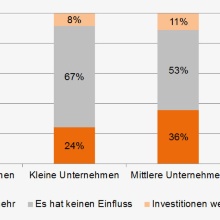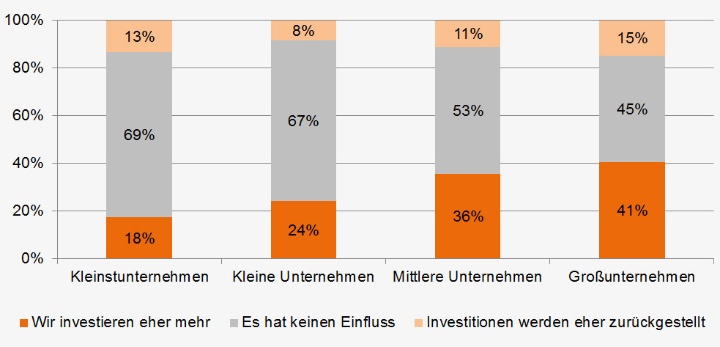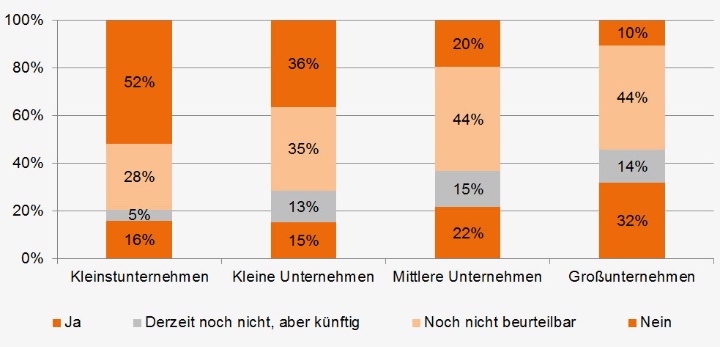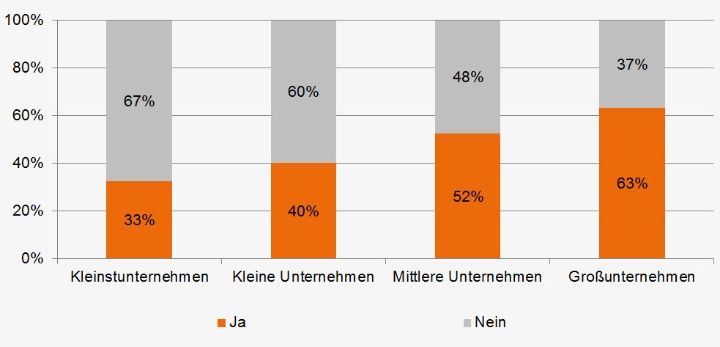Only twelve percent of the enterprises defer investments in energy efficiency due to low energy costs. This was the result of the summer survey of the Energy Efficiency Index EEI, in which 637 enterprises participated. The Institute for Energy Efficiency in the Production EEP of the University of Stuttgart has been conducting surveys every half-year since 2013 on energy efficiency as regards current and planned activities by German industry – in cooperation with the German Energy Agency (dena), the Confederation of German Industry (BDI), Fraunhofer IPA and TÜV Rheinland.
Even low energy costs are not discouraging enterprises from investing in efficiency measures. Over 40 percent of the large enterprises state that they are investing more rather than less in the case of decreasing energy costs. In terms of smaller and medium-sized enterprises there are anyhow still 25 to 35 percent that think in this way.
“The enterprises that act in this way recognise the opportunity in the case of liquidity that become available of investing in efficiency and thus in the future”, is how the EEP chairman of the Advisory Council, Heinz Dürr, explained this effect.
However, the Energy Efficiency Index decreased in the last half-year from 2.80 to 1.84. This means that the climate surrounding the energy efficiency increase has become overcast again compared to the previous period. A small recovery is also anticipated again. “Possibly a result of the current political turbulences around the new regulations”, is what Mr Dürr and EEP Manager, Alexander Sauer, presume.
Uncertainty with regard to the effect of Industry 4.0
Over two thirds of those questioned smaller and medium-sized enterprises (SMEs) see no potential for more energy efficiency through the digitalisation or are not yet in a position to judge this – meaning they are sceptical. All the same 23 percent welcomed the positive impact of Industry 4.0. For the future 13 percent expressed positive opinions regarding this question. As a result confidence grows with the size of the enterprise. Associated with the digitalisation is the flexibilization of the demand for energy. The result in the energy field is also the challenge not to lose the small and medium-sized enterprises in terms of the topic of Industry 4.0.
Demand-Side Management splits the industry
The flexibilization of the energy demand is an important topic for 51 percent of the enterprises in future; the other half does not see it like this. Here too the perceived relevance increases with the size of the enterprise. In this way 63 percent of the large enterprises consider the flexibilization as relevant in the future. “A good third of the industrial energy consumption in Germany applies to small and medium-sized enterprises. If we wish to develop the full potentials, better information must be provided here and the regulations have to be adapted. A further problem is the lack of market environment. Even those enterprises that consider flexibility important cannot implement it because the suppliers or customers are lacking”, according to Mr Sauer.
For around half the enterprises energy efficiency is not an integral part of the marketing strategy either as a purchase argument or for image reasons. “Let us wait and see which effect the newly launched campaign of BMWi “Germany does it efficiently” has here. We will keep our eyes on this”, according to the Head of EEP, Mr Sauer.
All images can be downloaded here: www.eep.uni-stuttgart.de
Further information:
Press contact: Dr. Birgit Spaeth, Pressestelle EEP – Universität Stuttgart, Tel. +49 711 970-1810, e-mail
Professional contact: Dipl.-Wi.-Ing. Diana Wang, Projektleiterin Energieeffizienz-Index, T +49 711 970-3839, e-mail





